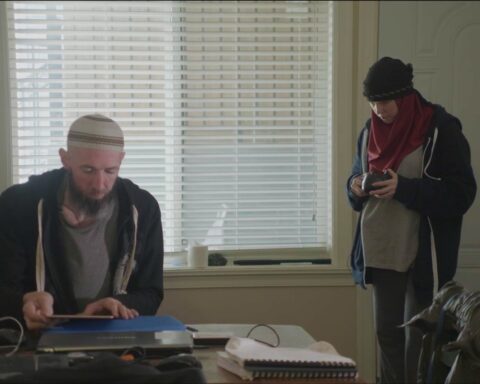American Animals
(USA, 100 min.)
Dir. Bart Layton
American Animals spins the phrase “based on a true story” on its head. This innovative and exhilarating docu-drama hybrid from Bart Layton (The Imposter) masterfully straddles genres and art forms while examining a crime gone wrong. As with The Imposter, American Animals is a fast-paced and electrifyingly stylish film that puts the art of storytelling at its core as multiple speakers and perspectives create a kaleidoscopic portrait of a bizarre tale of true crime.
The film dramatizes a 2004 incident in which four college students botched a heist in the special collections room at Kentucky’s Transylvania University library. Boys will be boys and the gang riffed on heist films to prep for the big score, which included rarities such as a first edition of Charles Darwin’s On the Origins of Species by Natural Selection and four folios of John James Audubon’s Birds of America. Crib notes from Snatch and Ocean’s Eleven don’t make for smart gangsters, and the young men see their privileged lives snuffed out in an exercise of coolness run awry. Layton meditates on the consequences on their actions unlike any filmmaker has done before.
Layton largely composes the film as narrative fiction with a dramatized caper that shifts styles and tones as the boys approach the fateful heist. The “masterminds” behind the heist are Warren Lipka and Spencer Reinhard, played by Evan Peters (Kick Ass) and Barry Keoghan (Dunkirk), two students already feeling tired with being part of the crowd. Feeling destined to exceed their classmates, as kids raised to believe they’re precious snowflakes often do, Lipka and Reinhard take a cue from Danny Ocean and play a game of “monkey see, monkey do” at the school library. (Because if anything made anyone look cool, it’s stealing books.) They recruit fellow students Eric Borsuk (Hello Destroyer’s Jared Abrahamson), an aspiring FBI agent looking to experience something “real”, and Chas Allen (Blake Jenner, The Edge of Seventeen), who takes the gig out of financial necessity. They’re a motley crew of misguided young men.
The dramatic narrative draws upon interviews Layton performed with the characters’ real life counterparts and American Animals relishes in the gaps between details. In the vein of last year’s true crime mockumentary I, Tonya, American Animals dexterously plays with the unreliability of memory and the subjectivity of the truth. Stories change, details blur, and when multiple parties tell a story of deviant behaviour, one can never be sure whom to trust. In some cases, Layton repeats actions within the script with details warped to fit the characters’ recollection of the past. These details are akin to Hollywood myth making as the story always calls for a bigger and better fish.
American Animals doesn’t concern itself with the allure of the con that often makes heist movies like Ocean’s Eleven such haywire thrills. Layton instead favours the consequences of the actions, since anyone who watches the better heist movies, like Dog Day Afternoon and Asphalt Jungle, knows that crime doesn’t pay. American Animals ingeniously injects the voices of the four students, now aged by over a decade after spending years in prison, as they reflect upon their crimes and the lives they threw away. Lipka, Reinhard, Borsuk, and Allen display genuine remorse for actions and their interviews are unexpectedly soul-searching and cathartic.
This sentiment makes American Animals uneasy viewing as Layton asks audiences if these charismatic young men merit sympathy. The easy answer is to dismiss them as over-privileged kids who didn’t realize that bad actions have consequences. The harder and more compelling angle is one of empathy as the interviews and dramatization frame a culture in which settling for a life of middle class contentment simply isn’t acceptable. The film is extremely relevant in 2018 as more cultures from England to the USA to Ontario adopt a “me first” attitude and say that personal gain has more value than social good. At the same time, these boys, who flipped their heist in the days before YouTube viral videos and Twitter toxicity, simply did on a spectacularly grand scale what many people do on a daily basis: act without concern for consequences in the digital sphere.
The film finds great emotional weight by including a voice that lets the consequences of the crime reverberate strongly. The school librarian, Betty Jean Gooch, gets the most memorable scenes of the film as Layton revisits the crime. The librarian first appears in the dramatic episodes in which the great character actor Ann Dowd (Compliance, The Handmaid’s Tale) plays Gooch as she tours the boys through the library before they assault her with a stun gun and leave her bound and gagged while they make off with the books. The heist occurs twice. It first appears as a stylish and breezy score in which the students effortlessly handle Gooch as if she’s a party in a dance number set to Elvis Presley. The second time dramatizes the real deal and it’s messy and disturbing, as Gooch doesn’t succumb easily to the boys’ assault. She fights back with all her might. Just revisiting the crime sees the subjects shaken in their interviews: they’re still scarred by what they did to a woman who went to work every day to help students succeed.
Gooch gets the final say in the film and her perspective is invaluable. She speaks with an audible tremor in her voice as she reflects upon the experience, but her assessment encapsulates the futile choice of crossing the line into criminal behavior. It’s a sobering wake up call for the pleasures of a life lived on the straight and narrow. By blending the fleeting thrills and real world consequences of this wild heist, American Animals is true crime at its finest.
American Animals opens in Toronto, Calgary, and Montreal on June 22.










